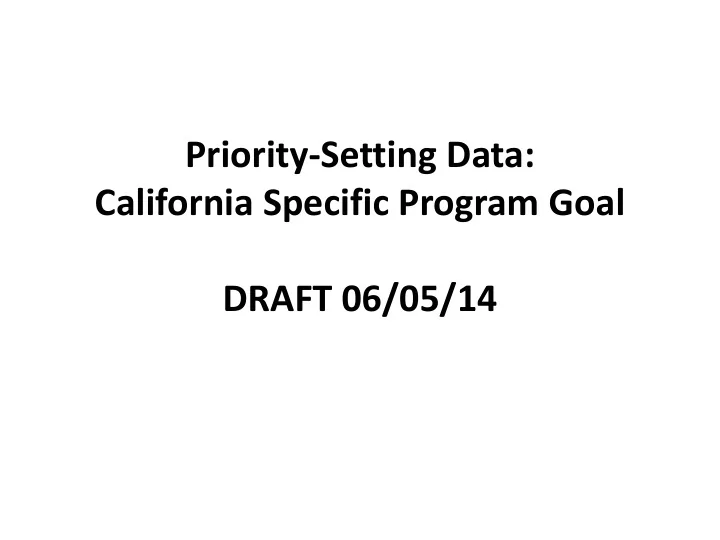

Priority-Setting Data: California Specific Program Goal DRAFT 06/05/14
Overview of 2015 Priority-Setting Process 1. Review the CBCRP mission statement and reaffirm the program’s foundation of long-term outcomes. 2. Review and revise the priority criteria and generate data collection questions. 3. Gather and analyze pertinent data as indicated by the priority criteria and data collection questions. 4. Identify and make decisions on long-term (5 years) priorities through a data-driven, group decision-making process. 5. Incorporate priority decisions into CBCRP operational plans and award cycles.
Timeline for the 2015 Priority-Setting Process 6/13 10/13 1/14 4/14 6/14 9/14 12/14 3/15 Responsive X Translation X Capacity Building X X Public Health Outcomes X Disparities California Specific X Innovation X Collaboration X Non-Duplicative X Policy X Decision-making Retreat X
Program Goal • Program Goal for California Specific: fund research that utilizes resources particular to California and/or addresses a breast cancer need that is specific but not necessarily unique to the burden of breast cancer in California
What do we Mean by California Specific? • Investigates populations that are rare in other parts of the country or take advantage of the diversity of California; • Addresses policies specific to California and/or health care systems in California; • Addresess topics of particular interest to Californians; and/or • Utilizes unique CA resources (e.g. cohorts)
Information Questions Question 1. What is the current burden of breast cancer in California? Question 2. What are the current gaps and opportunities in disparities research, prevention research, and environmental links to breast cancer, with a particular emphasis on CA specific research and opportunities? Question 3. What investment has the Program made in CA specific research? Question 4 Specifically, what role has the SRI/CBCPI set aside had in CBCRP's investment in California-specific research?
Question 1: BURDEN OF BREAST CANCER IN CA
Insert Sharan’s Slides
Question 2: GAPS AND OPPORTUNITIES IN CA SPECIFIC RESEARCH: DISPARITIES, PREVENTION AND ENVIRONMENTAL LINKS
Insert Sharan’s Slides
Question 3: INVESTMENT IN CA SPECIFIC RESEARCH
CA Specific Research: CBCRP Investment Cycles 1-14 Cycles 15-19 Total $ $29.8 Million $30.4 Million Invested Average per $2.1 Million $6 Million year % of total 17% 57% investment Cycle 15: 2009 first year of the 30% set aside for SRI
Investment by Priority Area: Cycles 1-14 CA Specific Grants by Priority Area: Cycles 1-14 Detection & Treatment 17% Etiology & Community Prevention Impact 27% 56% By Dollars Invested
Investment by Priority Area: Cycles 15-19 CA Specific Grants by Priority Area: Cycles 15-19 Detection & Treatment 17% Community Impact 25% Etiology & Prevention 67% By Dollars Invested
Investment by Institution & Investigator • 19 Unique institutions funded • 45 projects/50 grants* • 13 of 19 in Northern California • 13 academic and 6 community Institutions • 40 unique PIs funded • >1 grant: Anna Wu, Peggy Reynolds, Scarlett Gomez, Anna Napoles, Marilyn Kwan, Barbara Cohn * Most CRC projects have 2 institutions/grants funded by not all
Investment by Award Type CBCRP CA Specific Grants Cycles 15-19 by Dollars IDEAs Postdoc 5% 0% Translational 12% CRC SRI/CBCPI 14% 70%
Themes by Award Type • SRI/CBCPI : by design research funded is CA Specific • CRC : 10/17 awards since Cycle 15, focus is shifting to etiology and prevention, disparities • Translation :4/8 have been CA specific • IDEAS : just 7/67 since Cycle 15– utilizing CA cohorts, CA policy
Question 4: CONTRIBUTION OF SRI/CBCPI
Contribution of SRI/CBCPI to CA Specific Research in CBCRP Portfolio • Almost all SRI/CBCPI Projects are California Specific Examples 1. The Immigrant Experience and Breast Cancer Risk in Asians 2. California Chemicals Policy and Breast Cancer 3. Cancer Mapping: Making Spatial Modeling work for Communities 4. Persistent Organic Pollutants and Breast Cancer Risk 5. Women Firefighters Biomonitoring Collective
(DRAFT) Conclusions: Burden of Breast Cancer In CA
(DRAFT) Conclusions: Gaps and Opportunities
(DRAFT) Conclusions: CA Specific Research-CBCRP Investment • SRI/CBCPI has significantly increased CBCRP’s investment in CA Specific research – Focus on etiology and prevention, as well as disparities • Since 2009, CBCRP has invested over $30million in CA specific – $20 million from SRI/CBCPI • CRC awards also represent a large portion – CRIBS training helped boost applications/CA Specific • Translational and IDEAs also contribute, lesser extent • Funded a variety of PIs and types of institutions.
(DRAFT) Conclusions: Unique Contribution of SRI/CBCPI • The SRI/CBCPI has been the leading driver in the increase of California-specific research funded by the CBCRP. • Almost all of the SRI/CBCPI projects have been California specific and have given the Program the opportunity to fund unique, California specific projects that would not have been supported by the Program previously with investigator-initiated funding mechanisms.
Recommendations (DRAFT) • Continue SRI/CBCPI set-aside focusing on disparities, environmental links to breast cancer, and prevention. • Continue funding CRC Awards • Continue supporting outreach and training opportunities for CRC awards with special emphasis on increasing applications in the disparities, environment and prevention areas. • ???
Recommend
More recommend